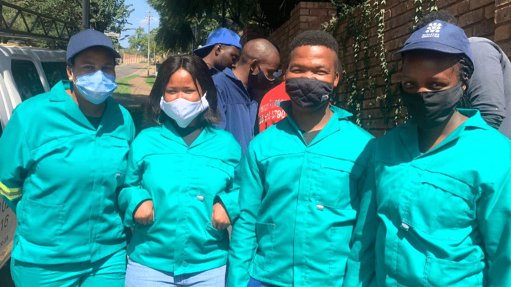
South African youth are being trained for trade apprenticeships
The British High Commission in South Africa has launched a new initiative to work with local partners to train unemployed youth in technical skills.
The investment aims to give marginalised youth increased access to trade apprenticeships in an effort to help them gain sustainable work and reduce unemployment in the country.
The British government will be investing up to £75-million of Official Development Assistance (ODA) globally on skills development, operating across nine fast-growing economies. In South Africa, its investment is dedicated to addressing the skills gap, skills mismatch, and quality training for unemployed youth and youth in post-school education and training to align with South Africa’s priorities on improving technical and vocational education and training (TVET).
In partnership with Harambee Youth Employment Accelerator and implementation partners, the Institute of Plumbing of South Africa (IOPSA), the National Business Initiative (NBI), and BluLever Education, the programme aims to skill 200 marginalised young people for income-earning opportunities using technical skills. In addition, a further 100 underemployed young people will be assisted in gaining a formal qualification, which will help to improve their earnings and career prospects.
Harambee selects candidates through the sayouth.mobi platform, a zero-rated, data-free network that matches work-seekers to earning and learning opportunities. BluLever and NBI offer two newly developed learning models, namely a three-year apprenticeship programme that prepares graduates to work on their own, and a short, high-impact nine-month programme aimed at providing entry-level skills needed by industry.
"Harambee stresses the importance of partnerships," says Harambee sector lead: water and plumbing Sherrie Donaldson. "When these partnerships focus on inclusive growth and mutual interests, barriers can be reduced, and sectors can create jobs to be filled by young people who would otherwise be locked out of the economy.”
She adds that the UK support has allowed Harambee and its partners to demonstrate that sector-wide collaboration can, and does, result in real impact on systems-change and effect which can be adopted at scale.
“A collaborative approach by the partners in this programme means we can focus on addressing systemic problems in vocational training. The funding provided by the UK government is an essential part of the improvements we're making, meaning employers will be able to employ TVET college graduates with confidence,” comments IOPSA executive director Brendan Reynolds.
The first cohort of trainees began in 2020, and are now receiving on-the-job training, with the programme coordinators highlighting the positive feedback received from employer partners.